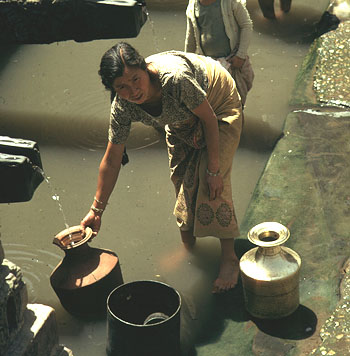UN affirms water is a legal human right
 Long overdue, 2 important steps have been taken this year to formalise the human right to water.
Long overdue, 2 important steps have been taken this year to formalise the human right to water.
In July, the UN General Assembly declared that safe and clean drinking water and sanitation constitute a human right essential to the full enjoyment of life and all other human rights.
Although no-one voted against the motion, 41 abstained from the GA vote, including the developed nations of Australia, Aotearoa/New Zealand and Japan, Austria, the Czech Republic, Greece, Iceland, Luxembourg, Denmark, the Netherlands and Sweden, the UK and Ireland, Israel, the USA and Canada.
On 30 September, the Human Rights Council – the UN's human rights treaty-making body and counterpart to the UN Security Council – unanimously declared the right to water and sanitation as implicit in existing human rights treaties:
“The human right to safe drinking water and sanitation is derived from the right to an adequate standard of living and inextricably related to the right to the highest attainable standard of physical and mental health, as well as the right to life.”
 As such, this ‘new’ right is legally binding in international law, according to the UN Independent Expert on human rights obligations related to access to safe drinking water and sanitation, Catarina de Albuquerque (pictured right):
As such, this ‘new’ right is legally binding in international law, according to the UN Independent Expert on human rights obligations related to access to safe drinking water and sanitation, Catarina de Albuquerque (pictured right):
“The right to water and sanitation is a human right, equal to all other human rights, which implies that it is justiciable and enforceable."
An estimated 884 million people around the globe have no access to clean, drinkable water, according to the UN Environment Programme, and their numbers are growing.
More than 2 million people die every year due to lack of drinking water and diseases caused by consuming polluted water. Small children are especially vulnerable.
Almost 2.5 billion people have no access to toilets and other sanitation facilities.
In the Human Rights Council resolution, all countries are asked to establish accessible accountability mechanisms by which people can obtain remedy for violations of their right to water.
Governments are also expected to regulate private water companies.
Read the full UN resolution in any of the 6 UN working languages here.

Dear Olivia,
Earlier this year I read “The Big Necessity” by Rose George (about toilets/sanitation rather than water); but really interesting. Highly recommended.
Julie.